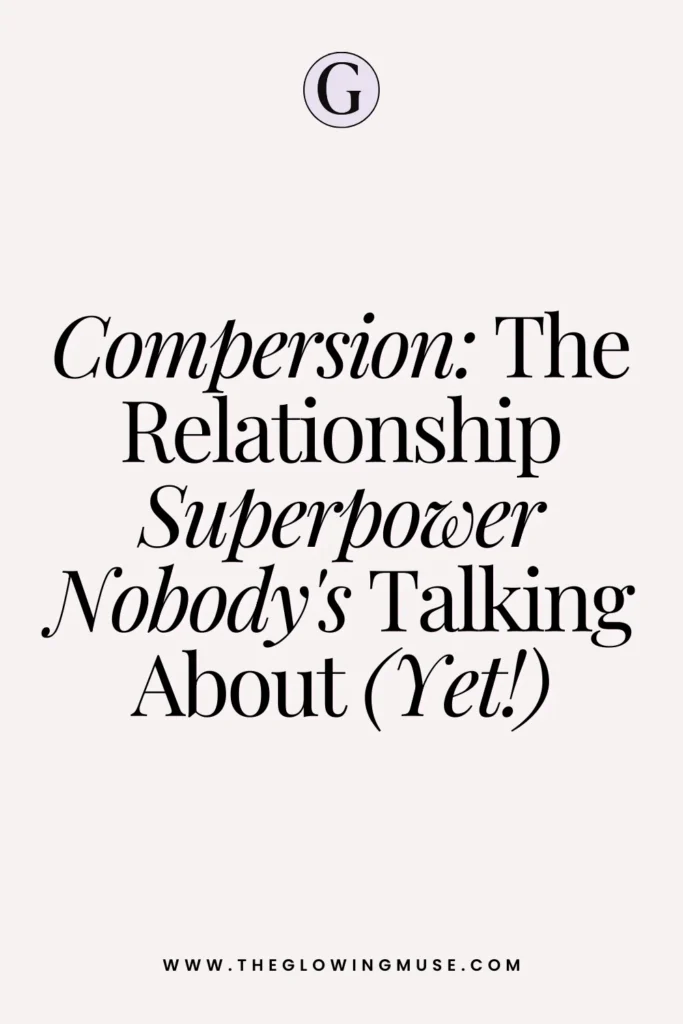Heads up! We may use affiliate links in this post. You'll never pay more, but we might earn a small commission if you buy - thanks for supporting us! See our full disclosure here.
In a world where jealousy gets all the attention, there’s another emotion silently transforming relationships from the inside out.
Compersion—that beautiful feeling of joy when your partner experiences pleasure or happiness through someone else—isn’t just relationship theory for the polyamorous crowd anymore.
This emotional superpower stands in stark contrast to what we’re typically taught about love and possession.
Remember those rom-coms where characters melt into puddles of jealousy at the sight of their partner simply chatting with another attractive person?
Compersion flips that script entirely.
The concept has roots in non-monogamous communities, where it was first named and celebrated, but it’s finding its way into all types of relationships now.
And truthfully? It might be exactly what your connection needs, regardless of your relationship structure.
The History & Science Behind Compersion
The word “compersion” has surprisingly recent origins. Coined in the late 1980s by the Kerista Commune in San Francisco, it emerged as a necessary term to describe an emotional experience that lacked vocabulary in our jealousy-focused culture.
The community needed language for this distinctly positive feeling that stood in contrast to possessiveness, but my goodness! It would help if my spell-checker could catch up and stop changing the word to “compression” on here…anyway back to the post. 🙄
Recent research has begun to unpack what makes compersion tick. In one fascinating study, researchers recruited 44 people in consensually non-monogamous relationships who had experienced compersion.
Got to go? Save this post on Pinterest for later

Through detailed surveys, they identified key factors that either helped or hindered these feelings of joy at a partner’s happiness with others.
The results revealed three main themes influencing compersion: individual factors like self-worth; relationship characteristics such as security and communication; and feelings about one’s “metamour” (your partner’s partner).
Participants who reported the strongest experiences of compersion pointed to feeling secure in themselves, having their needs met, maintaining open communication with partners, and genuinely liking their metamours.
What Are The Pros & Cons Of Compersion In A Relationship?
Finding genuine happiness in your partner’s joy—even when you’re not the source—creates an emotional freedom that conventional relationship wisdom rarely acknowledges.
It’s the relationship equivalent of finally letting go of those jeans you’ve been holding onto for a decade “just in case.”
What makes compersion so revolutionary isn’t just what it is, but what it reveals about our deeper capacity for love beyond possession.
It asks us: Can we love someone so fully that their happiness becomes our own?
Here’s what embracing compersion might bring to your relationship:
The Pros
- Deeper emotional intimacy: When you can genuinely celebrate your partner’s joys (all of them!), you create space for more authentic connections and fewer hidden feelings.
- Less stress and anxiety: Compersion offers an alternative to the exhausting vigilance of jealousy. That mental energy you spend worrying? Redirect it toward something that actually serves you.
- Personal growth: Learning to feel compersion often requires developing other emotional skills like communication, self-awareness, and security—all relationship superpowers in their own right.
- More joy in your life: It’s simple math—when you can experience happiness through your partner’s experiences, you’ve multiplied your sources of joy.
- Freedom for both partners: When neither person feels restricted by the other’s insecurities, both can explore interests, friendships, and experiences more fully.
The Cons
- It takes work: For most of us raised on rom-com jealousy as the marker of true love, compersion doesn’t always come naturally at first.
- Societal confusion: Try explaining to your brunch friends that you’re thrilled about your partner’s exciting evening with someone else, and watch their faces twist in confusion.
- Potential for ignoring boundaries: Sometimes, people misuse compersion as pressure to accept situations that genuinely cross their boundaries. True compersion never requires sacrificing your authentic needs.
- Emotional complexity: You might feel both compersion and jealousy simultaneously, creating a confusing emotional cocktail that takes time to untangle.
- Not a quick fix: Developing compersion won’t magically solve relationship problems—it’s a capacity that tends to flourish in already healthy dynamics.
My Opinion On Compersion
In theory, compersion seems like an incredible way to tune into your partner’s needs and truly celebrate what brings them joy.
Let’s be honest—being genuinely happy for your partner’s achievements should be relationship baseline anyway, not some advanced emotional technique!
Things get tricky when compersion extends into intimacy in monogamous relationships. It can quickly become a slippery slope if one partner starts advocating for compersion in contexts where both aren’t fully on board with bringing other people into the equation.
I think relationship dynamics are far too nuanced to make blanket statements. Not experiencing compersion in every situation doesn’t automatically make you a jealous person.

You might be absolutely thrilled about your partner’s promotion at work but feel uncomfortable with them developing close emotional bonds with an attractive coworker who clearly has other intentions.
Compersion in friendships tends to flow more naturally since the expectations and boundaries differ from romantic relationships.
You probably don’t think twice about feeling happy when your best friend connects with someone new—there’s no possessiveness muddying those waters.

Perhaps the key is to use compersion as a compass rather than a rule book. Where do you naturally feel joy for your partner, and where do you notice resistance?
Those emotional responses often reveal your authentic boundaries better than any relationship advice could.
The goal isn’t becoming someone who never experiences jealousy—it’s building enough self-awareness and security that you can distinguish between protective instincts worth honouring and possessive reactions worth examining.
In the end, compersion isn’t about erasing your own needs to accommodate a partner. It’s about expanding your capacity for joy while staying true to yourself. That balance looks different for everyone—and honestly, that’s exactly how it should be.










